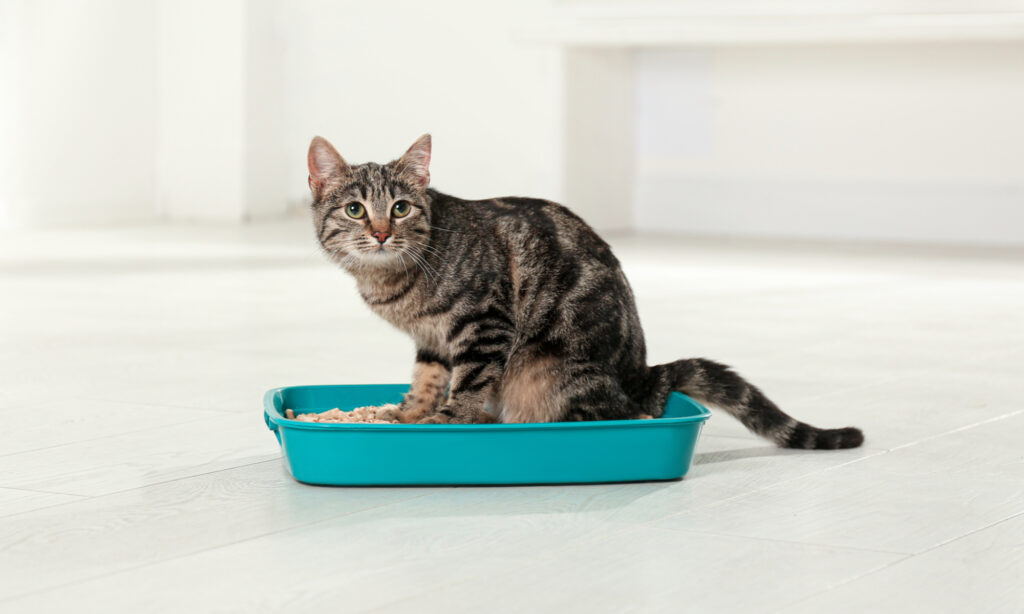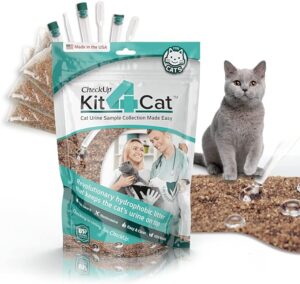Your male cat is peeing outside litterbox
If there’s one annoying thing about cats, it’s that they sometimes pee in the house. It rarely happens, but it is super annoying if your male cat pees in your house outside the litter box. When male cats do it, there are two possible causes. First of all, a male cat can spray in your house, but he can also just pee in the house. Peeing is therefore different from spraying. If there is stress involved, both are possible. Stress can cause a cat to spray more in the house, but also to urinate in different places.
Also, for some reason, a male cat might have developed a fear of the litter box and has therefore decided not to urinate in that scary thing anymore. Your tomcat will then find it a better option to just pee in random places around the house. Your bed, for example. And yes, that is super awfull. But there’s no point in punishing your male cat who pees in the house. There is a reason for this behaviour and as long as you do not solve the cause, punishment only increases stress and may therefore lead to even more spraying or urinating in the house.
Difference between spraying and urinating for male cats
Male cats usually spray to mark their territory. The urine of a male cat contains substances called “pheromones”. These substances can be compared to a scent and they let other cats know that the area where your male cat has sprayed is already occupied. It sais “get lost!”. With regular urination, the goal is only to get rid of the urine and not to drive away another cat. However, it is also true that male cats spray more when they are stressed or feel insecure. Or if they do not feel completely well medically. It is therefore wise to always perform a urine test if your male cat urinates or sprays in the house. You can read later in the article how you can do this yourself.

Recognizing spraying with a male cat
The difference between spraying and regular urination in male cat can sometimes be difficult to determine, but there are differences you can use to try to distinguish between the two:
- Posture: Cats that just pee usually do so by crouching or standing with their bottoms down in the litter box or outside in the grass. When spraying, on the other hand, a cat will typically hold his bottom up and direct the urine slightly upwards against a vertical surface.
- Location: Spraying is usually aimed at vertical surfaces such as walls, doors, furniture and curtains. Ordinary urination, on the other hand, takes place in the litter box or on the floor, usually horizontal surfaces. A bed is also a very popular place for cats to pee.
- Amount of urine: When spraying, a cat usually only sprays a small amount of urine, while with normal urination a larger amount of urine is released. However, with a bladder infection there are often small puddles of urine.
- Frequency: Spraying behaviour may occur more frequently than regular urination, especially in unneutered male cats. Typically, cats only urinate 1-2 times per day, but they spray much more often.
Your male cat is spraying the house
Based on the above information, do you think your male cat is spraying? In that case, it is important to have your male cat neutered if that didn’t happen yet. This can be done surgically by removing his testicles. But sometimes people also want to use the male cat to reproduce. In that case, you might consider having your male cat chemically neutered. That is, your vet can give him an injection of a hormone that suppresses your cat’s testosterone production for about 12 months. The amount of testosterone in your male cat may increase during the first month and so the spraying might become more serious, but after that it should be a thing of the past for about a year.
It is also important that you remove the spray marks very well. If your cat can still smell it a little, chances are he will remember to spray it again later. After all, the smell has diminished considerably and so he has to mark it again. Apparently many male cats are not smart enough to remember where they sprayed, but do so based on the intensity of the pheromones. This cleaning is best done with Nature’s miracle advanced cat stain and odor eliminator spray. Avoid using products that leave a strong odor as this can only make your male cat more stressed or confused. And then of course he has to spray extra much to give himself the feeling of safety again.
Your cat pees in the house
If your cat pees in the house, outside the litter box, the problem is more difficult to solve. This may be due to a medical problem such as a cystitis or other pain during urination. Or something scary happened to your male cat while he was peeing in the litter box. Now he doesn’t dare to go in there anymore. For example, if another cat bullied him while he went to pee in the litter box. In all cases, it is important to examine your male cat’s urine to see if there might be a problem in his bladder.
Why do male cats spray?
The biggest reason why male cats spray is to establish their territory. In this way they let other male cats and queens know that they are the “owner” of that area. The pheromones in the urine of the male cat in question are spread from the urine through the air and let other cats know whether they are a male or a female and who exactly those pheromones belong to. Pheromones are very specific per male cat. Eventually they will know exactly whose urine it is.
Unneutered male cats spray more often because they are looking for a nice smelling lady-cat to mate with. Especially if a cat in heat is walking around near them, the tomcat will smell this and make more effort to convince her to mate with him. In other words, he will spray more. But spraying is also sometimes still done by neutered tomcats.
Spraying also serves to prevent physical altercations. Because male cats can not be present everywhere full-time, they can’t always chase away that other intruder of a male cats. Using their sprayed urine, they clearly tell another tomcat to get lost. Most male cats will listen to that. But sometimes you have quite a stubborn one. And unfortunately, your cat has to physically let him know that this is his territory. The question, however, is which of the two will win the battle.
Why does your male cat pee in the house?
Your male cat pees outside the litter box in the house when he is not in optimal condition. There may be a medical cause for this, but he may also suffer from stress. At the same time, stress can also cause medical complaints and so it is sometimes not entirely clear whether it is physical or mental.
In addition, it often happens that something bad happened while your male cat was urinating in the litter box. A loud bang that startled him, another cat that was bullying him so that he couldn’t get out, for example. Or he simply doesn’t like those cat litter granules. Well, us humans also have certain preferences for toilet paper, right? Oh, and don’t forget that a dirty litter box is also a good reason for a male cat to pee somewhere else. As a rule, you should have 1 litter box per cat plus 1 extra in your home. So with 2 cats in the house you need 3 litter boxes. And you also have to keep them really clean!

At what age does a male cat start spraying?
Territorial behavior usually starts as soon as your male cat starts producing testosterone. This is usually at 5-6 months of age. But sometimes it takes months longer before your cat realizes that he needs to start spraying. So anywhere from 6 months to a year of age, you may start to see your cat start spraying.
Your neutered male cat is spraying in the house
As we wrote earlier, spraying is not just about marking the territory. It may be the biggest reason, but just like cats, neutered male cats can also have a need to mark their territory. This urge is usually less strong than in unneutered male cats. But especially if a cat is a bit insecure or not feeling well, he will try to boost his self-confidence by spraying more in the house. In this case, it is up to you as the owner to find out why your male cat is not feeling well.
How can you stop a male cat from spraying?
The question is, should you unlearn it? In fact, spraying in the house indicates that your unneutered male is ready to face the attractive females. Spraying is therefore a primal instinct and can’t be unlearned. You can have him neutered so that his sexual urges decrease and therefore hopefully also his spraying behaviour.
But if we are talking about a neutered male cats that pees in the house, then there is no point in trying to un-learn him from spraying. After all, your male cat is doing this because there is a problem. It is up to you now to investigate whether the problem is medical or whether it could be psychological. We will let you know how to get started with this later in this article. But to resolve the spraying you need to resolve the problem that is bothering him.
How can you clean your cat's spraying?
It is important that no odors remain from the urine that your cat has sprayed or urinated. First of all, remove the wetness with a cloth. But when everything is dry, there is still a little bit of urine, containing your cat’s pheromones, on the surface. It is therefore important that the urine, which is invisible to you, including those pheromones, is removed.
However, many products contain scents that we humans think smell fresh, but which actually give cats the idea that another cat has urinated on their urine. This is, for example, with chlorine or ammonia. It is also possible that scents such as lavender or citronella cause your cat extra stress. And if he becomes even more stressed than he already was, he has to release that stress by spraying more. So yes, that is of course counterproductive.
For the above reasons, it is necessary to use a suitable cleaning agent that does not cause too much stress to your cat, but which gives us the feeling that it has become clean. It is therefore best to use the Nature’s miracle advanced cat stain and odor eliminator spray. You spray this on the surface that your cat sprayed or peed on and clean it thoroughly. The enzymes in this product break down the pheromones and urine-substances of your cat so your cat doesn’t smell anymore that that was the place he sprayed on.
What to do if your male cat pees in the house?
Urine examination by your vet if your male cat urinates in the house
It is very important to at least do a urine test on your male cat. After all, you don’t want him to keep walking around with a cystitis or urinary crystals.
It is best to collect urine using Kit4Cat cat litter and take it to your vet to have it examined. And yes, it doesn’t work if your cat doesn’t pee in the litter box. But then you can at least use the pipette to suck up the urine from the ground and insert it in the tube. Everything you need is in the package. Your vet can immediately check whether your cat is suffering from urinary crystals. You can’t do that yourself. Urinary crystals can be a reason for the formation of a cystitis or for the formation of urinary stones that can become stuck in the penis of your male cat. This may cause your cat to have difficulty urinating, or even stop urinating altogether.
Adjust his diet if your male cats pees in the house
You can possibly put your cat on a more expensive diet that prevents the formation of urinary crystals. The chance that there will still be urinary crystals becomes very small after giving that food. In addition, the acidity of the urine is also improved so that there is less chance of a cystitis developing. It is also best to give a male cat that pees in the house a lot of wet food. This ensures that he makes more urine and therefore flushes (and thus clean) his bladder more often.
Do a urine test on your own if your male cat pees in the house
But you can check whether your cat has a cystitis yourself. It is just not possible for you to find urinary crystals. If you want to do your own testing, you can use the special litter to get a urine sample. But if your cat really only pees or sprays on the floor and it is enough urine, just the test strips are enough. But it is better to use urine from a clean litter box with the special litter. So if you have a choice, you use the clean urine.
Immerse the strip completely in the urine and remove it immediately. Shake off a little and leave for 30 seconds. You can then compare the test strip with the sample sheet. We will discuss the results further below.
How do I know if my cat has a bladder infection?
With a cystitis, the pH is usually higher than 8, leucocytes are present (but this is often false positive in cats!), there are proteins in the urine and blood is also present. In healthy urine the pH should be below 7 and there should be no leucocytes, no proteins and no blood. Nitrite should not be in it either. If nitrite is present in the urine, this is a signal that there is probably a bacterial cystitis. Glucose and ketones may also not be present, but this is usually not the case with a cystitis. They indicate diabetes. Urobillinogen and billirubin might be raised when there is a liver problem. Specific gravity is unreliable, but should be around 1035 in normal cats. If it is a lot lower than you need to contact your veterinarian. If it is higher, than your cat needs to drink more water.
Your male cat pees in the house because he doesn't like the litter box
In this case we mean the shape of the litter box, the size of the litter box or the type of litter box granules. It is best to experiment with this. Use an open container, a closed container without a lid, a different granule, or try to see if he likes a regular cardboard box. Or try to see if he just likes normal sand. You can try everything you can think of. Make sure that your cat does not experience excessive stress from this constant changes. Otherwise he will have reason to pee outside the box even more.
Your male cat is peeing in the house due to stress
Cats are sometimes very sensitive to stress. And this can manifest itself in excessive washing behavior, behavioral problems towards you as the owner or towards other pets, but stress can also easily cause a cystitis or your cat will reduce its stress by spraying. The cause of your male cat urinating in the house could very well be caused by stress in your male cats.
To prevent other cats from entering your home, you can install a cat flap that contains a chip to open it. And it is also better to fence off your garden so that other cats are less likely to come and hang out in “his” garden.
In addition, you can increase the distance between your own cats if they are stressed by each other. For example, it can be very disturbing for a cat if he is dozing off on a chair and his rival walks past him. You can improve this by placing an extra blanket on high cupboards or shelves on the wall so that they can sleep safely there. Make sure that they cannot easily slide off and injure themselves.
If your cat really experiences stress from everything, you can consider giving him the Calm diet from Royal Canin. This food contains additional ingredients that naturally increase serotonin levels in the brain. This will make your male cat feel more confident and less likely to experience stress from something. This food also contains an S/O index, which means that in principle no urinary stones will be formed. This way you tackle two causes at the same time.
Good luck!
Hopefully we have given you a lot of things to try if your male cat is spraying or peeing in your house. Best of luck for the both of you in your battle against the urine!








